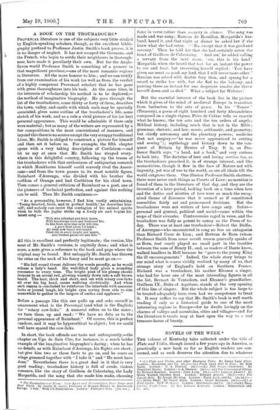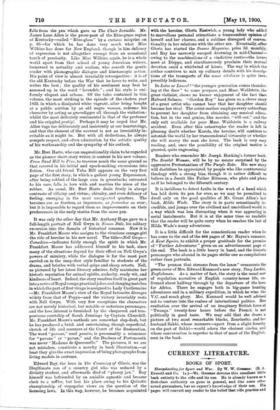NOVELS OF THE WEEK.*
THE volume of Kentucky tales collected under the title of Flute and Violin, though issued a few years ago in America, is practically a new book so far as English readers are con- cerned, and as such deserves the attention due to whatever • (1.) Flute and Violin, and other Kentucky Tales. By James Lane Allen. London : Macmillan and Co. [6s.]—(2.) From Sand Hill to Pine. By Bret Harte. London : C. A. Pearson. [6s.]—(3.) Nell Gwyn—Comedian. By Frankfort Moore. London : C. A. Pearson. [Gs.]—(4.) The Crowning of Gloria. By Richard Reardon. London : John Long. [63.]—(5.) Lotus or Laurel By Helen Wallace (Gordon Roy). London : Edward Arnold. [Os.)—(6.) The Purple Robe. By Joseph Ho.:king. London : Ward, Lock, and Co. [is. 6d.]- (7.) Hilda Wade. By Grant Allen. London : Grant Richards. [Cs.)—(8.) A Kent Squire. 'By F. W. Hayes. London : Hutchinson and Co. [Gs.] --(9.) Tony Larkin, Englishman. By Mrs. Edward Kennard. London : Hutchinson and Co. [Gs.) falls from the pen which gave us The Choir Invisible. Mr. James Lane Allen is the prose-poet of the Blue-grass region of Kentucky—called " Blue-glass " by a curious misprint on p. 65—for which he has done very much what Miss Wilkins has done for New England, though in him delicacy of expression is not altogether exempt from an occasional touch of preciosity. Like Miss Wilkins, again, he is a whole world apart from that school of young American writers, immersed in actuality and realism, who assault the gentle reader with phonographic dialogue and kinetoscopic action. His point of view is almost invariably retrospective : it is of the old Kentucky before the War that he loves to write, and writes the best ; the quality of his sentiment may beat be summed up in the word " lavendric " ; and his style is uni- formly elegant and urbane. Of the tales contained in this volume, the most striking is the episode of the cholera year 1833, in which a dissipated white vagrant, after being bought at a public auhtion by an old negro woman, redeems his character by acting as gravedigger all through the visitation : whilst the most delicately sentimental is that of the professor and his crippled protege. Perhaps it may be urged that Mr. Allen tugs too deliberately and insistently at our heartstrings, and that the element of the navrant is not as irresistibly in- evitable as it might be. But with all deductions, he always compels respect, and often admiration, by the artistic quality of his workmanship and the sympathy of his outlook.
Mr. Bret Harts, who can unquestionably claim to be regarded as the pioneer abort-story writer, is content in his new volume, Prom Sand Hill to Pine, to traverse much the same ground as that covered in his initial and epoch-making excursions into fiction. Our old friend Yuba Bill appears on the very first page of the first story, in which a gallant young Expressman, after being robbed of the large sum in greenbacks entrusted to his care, falls in love with and marries the niece of the robber. As usual, Mr. Bret Harts deals freely in abrupt contrasts of villainy and virtue; chivalry, and even delicacy of feeling, emerging in the most unexpected quarters. The heroines are as fearless, as ingenuous, as fctrouches as ever; but it is impossible to regard them as improvements on their predecessors in the early stories from the same pen.
It was only the other day that Mr. Anthony Hope gave us a full-length portrait of Nell Gwyn in Simon Dale, his solitary excursion into the domain of historical romance. Now it is Mr. Frankfort Moore who assigns to the vivacious orange-girl the rale of heroine in his new novel. The title—Nell Gwyn- Comedian—indicates fairly enough the spirit in which Mr. Frankfort Moore has addressed himself to his task, since many of the situations depend for their effect on Nell Gwyn's powers of mimicry, while the dialogue is for the most part carried on in the snap-shot style familiar to stadents of the drama, and bristles with verbal quips and sharp retorts. Nell, as pictured by her latest literary admirer, fully maintains her historic reputation for animal spirits, audacity, ready wit, and kindness of heart. Indeed, the story resolves itself in great part into a series of Royal romps,praetical jokes, and slanging matches in which the part of first virago is assigned to Lady Castlemaine —Mr. Frankfort Moore's view of the Royal favourite diverges widely from that of Pepys—and the victory invariably rests with Nell Gwyn. With very few exceptions the characters are not merely historical, but notable or notorious personages, and the love interest is furnished by the chequered and tem- pestuous courtship of Sarah Jennings by Captain Churchill. Mr. Frankfort Moore's methods are somewhat slap-dash, but he has produced a brisk and entertaining, though superficial, sketch of life and manners at the Court of the Restoration. The word " pavone," used passim, is presumably a misnomer for " pavane " or "pavan," and the Duchess of Portsmouth was never "Madame de Queronelle." The pictures, if we are not mistaken, constitute a novelty in book illustration,—at least they give the exact impression of being photographs from living models in costume.
Edward Ray, the hero in The Crowning of Gloria, was the illegitimate son of a country girl who was seduced by a divinity student, and afterwards died of " phossy jaw." Ray himself was befriended by an amiable agnostic and became clerk to a mgler, but lost his place owing to his Quixotic championship of unpopular views on the question of the licensing laws. In this way, however, he becomes acquainted with the heroine, Gloria Eastwick, a young lady who added to marvellous personal attractions a transcendent opinion of herself and her charms, and a sublime disregard of conven- tionality in her relations with the other sex. Eventually, after Gloria has started the Sussex Magazine, price 3d. monthly, and Ray has narrowly escaped drowning in mid-Channel- owing to the machinations of a vindictive rustic—the lovers meet at Dieppe, and simultaneously proclaim their mutual devotion amid a whirlwind of kisses. The way in which the author contrives to mix up culinary details with his descrip- tions of the transports of the amor vitulinus is quite inex- pressibly ludicrous.
In Lotos or Laurel? "the younger generation comes thunder- ing at the door" to some purpose, and Mine. Waldstein, the great violinist, shows no keener enjoyment of the fact than Halyard Solness. "Gordon Roy" has given us a clever story of a great artist who cannot bear that her daughter should become her rival. The artist-mother employs every subterfuge to prevent her daughter from obtaining any musical educa- tion, but in the end genius, like murder, "will out," and the only exit available for poor Mme. Waldstein is a railway accident. Even after this catastrophe the reader is left in pleasing doubt whether Karola, the heroine, will continue to astonish the world by her transcendental virtuosity or whether she will marry the man she loves. The book is very easy reading, and, once the possibility of the original motive is granted, quite engrossing.
Readers who remember Mr. Joseph Hocking's former book, The Scarlet Woman, will be by no means surprised by the aggressive Protestantism of The Purple Robe. His new story will doubtless be appreciated by people who like controversial theology with a strong bias, though it is rather difficult to believe in a Jesuit like Father Ritzoom, who plots and plans as if he belonged to the fifteenth century.
It is invidious to detect faults in the work of a hand which has laid down its pen for ever, so we may be permitted to dwell only on the good qualities of Mr. Grant Allen's last book, Hilda Wade. The story is in parts sensationally in- credible, and jumps over the civilised and uncivilised world in a way which was less distracting when it was appearing in serial instalments. But it is at the same time so readable that the reader will be quite sorry when he reaches the last of Hilda Wade's many adventures.
It is a little difficult for the conscientious reader when he has come to the end of the 444 pages of Mr. Hayes's romance, A Kent Squire, to exhibit a proper gratitude for the promise of "Further Adventures" given on an advertisement page at the end. The book is a little heavy in hand, and the historic personages who abound in its pages strike one as compilations rather than portraits.
"The pennon that streams from the lance" ornaments the green cover of Mrs. Edward Kennard's new story, Tony Larkin, Englishman. As a matter of fact, the story is the usual sort of regulation narrative of English country-house life, en- livened about halfway through by the departure of the hero for Africa. There he engages both in big-game hunting adventures and in a military expedition, in which he wins the V.C. and much glory. Mrs. Kennard would be well advised not to venture into the realms of international politics. Her exultation over the arrival of an imaginary British force at " Twanga " twenty-four hours before the French is not politically in good taste. We may add that she draws a picture of two most remarkable blacks, Zourinetta and her husband Sakki, whose manners—apart from a slight ferocity on the part of Sakki—would adorn the choicest circles, and whose conversation is superior to that of most of the English- men in the book.







































 Previous page
Previous page